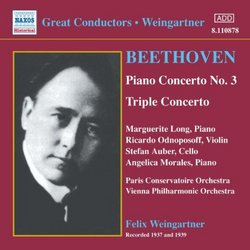| All Artists: Weingartner, Beethoven Title: Beethoven Concertos 1937 & 1939 Members Wishing: 0 Total Copies: 0 Label: Naxos Release Date: 5/18/2004 Genre: Classical Styles: Forms & Genres, Concertos, Historical Periods, Classical (c.1770-1830), Modern, 20th, & 21st Century, Instruments, Keyboard, Strings, Symphonies Number of Discs: 1 SwapaCD Credits: 1 UPC: 636943187821 |
Search - Weingartner, Beethoven :: Beethoven Concertos 1937 & 1939
 | Weingartner, Beethoven Beethoven Concertos 1937 & 1939 Genre: Classical
|
Larger Image |
CD Details |
CD ReviewsValuable Reissues from the 1930s J Scott Morrison | Middlebury VT, USA | 05/27/2004 (4 out of 5 stars) "This issue contains two Beethoven concerti (the Third Piano Concerto and the Triple Concerto) conducted by Felix Weingartner, whose work I hold in high esteem as any who have read my reviews of his Eroica and Ninth symphonies will already know. I made a silly but revealing mistake when I first listened to this CD. I had cursorily read the back cover of the jewel box, then headed out for a long walk with the CD in my Discman. The Third Concerto started and I had mistakenly thought the pianist was Angelica Morales. As it progressed I kept thinking, 'Why haven't I ever heard of this pianist before? This is GOOD!' It was only after I got back that I discovered that the pianist was not Morales, but Marguerite Long (1874-1966). That explained everything. The performance had been sprightly, delicately nuanced, and clear as a crystalline stream. Those are the expected qualities of Long's playing and she supplied it in fine style. Further, she played the rarely heard cadenzas by Ignaz Moscheles (1794-1870, a virtuoso among virtuosi of his day, possibly topped only by Liszt) and they are quite striking in their dramatic stength and their polyphonic expertness, a quality one would not necessarily expect from Moscheles, who is primarily remembered for his salon pieces. The orchestra is the Paris Conservatoire Orchestra, whose recorded sound is somewhat recessed and, alas, sounds its age (rec. 1939; we're informed by the transfer engineer, the redoubtable Mark Obert-Thorn, that the original recording was not particularly state-of-the-art even in its own day, and indeed there is some shrillness due to close miking). Weingartner gives us a fairly mainstream performance but his trademark dynamic and tempo subtlety is in plain evidence.The Triple Concerto features three instrumentalists of whom I'd never heard: Ricardo Odnoposoff, violin; Stefan Auber, cello; Angelica Morales, piano. (Strangely, I discovered on reading the booklet notes that Morales [1910-1996] had ended her career as Professor of Piano at my nearby state school, the University of Kansas). The real discovery here are the two string players, and in particular the cellist, Auber. The Triple Concerto has long been known to be a bit unbalanced in that the requirements of the pianist are not particularly demanding, but the cello part and, to a lesser extent, the violin part are extemely taxing. Aside from occasional intonational problems in the instrument's higher reaches, the cellist here is simply outstanding, and his playing alone almost makes this issue worth owning, especially if you are a cellist. Odnoposoff apparently is well known if a cursory glance at Grove's can be credited, but indeed I admit I'd never encountered him before that I recall. He is almost the match of Auber, playing with real élan and brilliance. Morales, I'm sorry to say, is not their equal. Her playing tends to be rather prosaic, not terribly inflected, even stolid. If I remember correctly, the piano part of the Triple Concerto was written for an amateur player and indeed I seem to recall a recording some years ago in which the pianist was a German politician. Be that as it may, the most interesting writing in the concerto is for the string players, and indeed they are rarely pitted against chordal writing in the piano, so that they are most often to the fore, and in this particularly recording that is all to the good. Odnoposoff and Auber strike sparks off each other. Again, the sound of the Vienna Philharmonic is somewhat subservient to that of the soloists (as in many a modern recording) and the sound itself is pretty good for 1937. Weingartner again demonstrates his well-known subtleties, especially in the lovely Largo movement. I'm not as over the moon about these performances as I was about the Eroica and the Ninth, but they are still worth owning, for Weingartner completists (particularly since the Long/Third Concerto recording is quite rare) and for those who are interested in performance practice issues from the thirties, e.g., the occasional use of portamenti that would sound out of place these days, but which give a certain air to the performance that I quite like. TT=68:35Scott Morrison" Great Beethoven Third Piano Concerto Ralph J. Steinberg | New York, NY United States | 03/30/2005 (5 out of 5 stars) "Margurite Long's and Felix Weingartner's collaboration in the Third Piano Concerto can stand with the best (meaning Schnabel's first recording), with Weingartner providing even more sensitive and impulsive accompaniment than Sargent for Schnabel. However, I now agree with those who do not consider the Triple Concerto as among Beethoven's best works, particularly the rather thematically-thin and overdrawn First Movement. Still, any Weingartner-Vienna Philharmonic recording is worth hearing."
|

 Track Listings (6) - Disc #1
Track Listings (6) - Disc #1